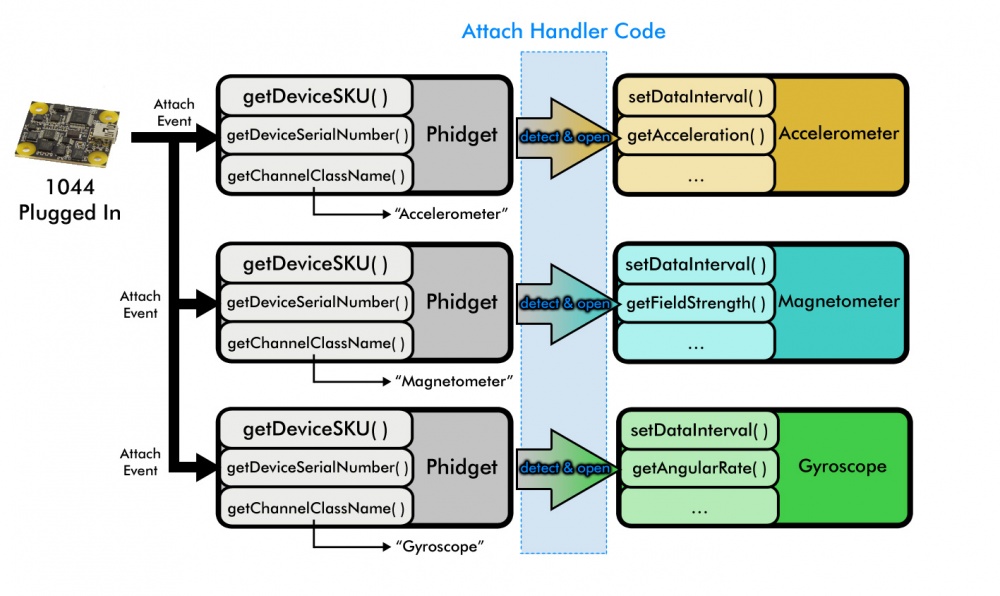Phidget Manager
General Overview
The Phidget Manager is an interface into the device channels available to the Phidget library. The API is strictly asynchronous, a continuously monitors channels as they attach and detach. Each Phidget exports one or more device channels, and when a Phidget is plugged into a system (or become available over the network), an attach event is fired for each channel available on that Phidget.
It is important to understand the concepts of attach and detach as the they relate to the manager. A manager attach does not imply that a user channel has attached to a device channel, but that the device channel have become available. The device channel is now ready to be attached to a user channel. When a user channel closes and detaches from a device channel a manager event will not be fired. A manager detach event is fired when the Phidget device is removed from the system.
Purpose
The primary function of a Phidget Manager is to fire an attach event for each new device channel when a Phidget becomes available to a system, and to fire a detach event for each device channel that is no longer available when the Phidget is removed from the system. For example, when a 1044_0 - PhidgetSpatial is connected, a Phidget Manager would fire three attach events, one for each device channel, as illustrated below:

Using the Phidget Manager
As with any other Phidget software object, the Phidget Manager must be opened, then attached within your code. Here's an example of how the manager is used in C:
int main() {
// Define the manager handle and create
PhidgetManagerHandle device = 0;
PhidgetManager_create(&device);
// Set up event handlers
PhidgetManager_setOnAttachHandler(device, AttachHandler, NULL);
PhidgetManager_setOnDetachHandler(device, DetachHandler, NULL);
// Open the Phidget Manager
PhidgetManager_open(device);
// Wait for attach/detach events
printf("Press Enter to end anytime...\n");
getchar();
// Close and clean up manager object
PhidgetManager_close(device);
PhidgetManager_delete(&device);
return 0;
}
void CCONV AttachHandler(PhidgetManagerHandle manager, void *userptr, PhidgetHandle device) {
const char *chanClass;
// Define handles and spatial variables
PhidgetAccelerometerHandle accHandle;
PhidgetGyroscopeHandle gyrHandle;
PhidgetMagnetometerHandle magHandle;
double acceleration[3];
double angularRate[3];
double fieldStrength[3];
// Get the class of this generic Phidget object that has just attached
Phidget_getChannelClassName(device, &chanClass);
// If the channel is an accelerometer, handle it accordingly:
if(strcmp(chanClass,"PhidgetAccelerometer") == 0) {
// Cast the generic Phidget object into a Phidget Accelerometer object
accHandle = (PhidgetAccelerometerHandle) device;
// Now that the channel is cast, we can call Accelerometer-specific methods like getAcceleration:
PhidgetAccelerometer_getAcceleration(accHandle, &acceleration);
// Print out the acceleration values and close the object
printf("Accelerometer attached! X:%f Y:%f Z:%f \n", acceleration[0], acceleration[1], acceleration[2]);
Phidget_close(accHandle);
}
// If the channel is a gyroscope, handle it accordingly:
if(strcmp(chanClass,"PhidgetGyroscope") == 0) {
// Cast the generic Phidget object into a Phidget Gyroscope object
gyrHandle = (PhidgetGyroscopeHandle) device;
// Now that the channel is cast, we can call Gyroscope-specific methods like getAngularRate:
PhidgetGyroscope_getAngularRate(gyrHandle, &angularRate);
// Print out the angular rate values and close the object
printf("Gyroscope attached! X:%f Y:%f Z:%f \n", angularRate[0], angularRate[1], angularRate[2]);
Phidget_close(gyrHandle);
}
// If the channel is a magnetometer, handle it accordingly:
if(strcmp(chanClass,"PhidgetMagnetometer") == 0) {
// Cast the generic Phidget object into a Phidget Magnetometer object
magHandle = (PhidgetMagnetometerHandle) device;
// Now that the channel is cast, we can call Magnetometer-specific methods like getFieldStrength:
PhidgetMagnetometer_getFieldStrength(magHandle, &fieldStrength);
// Print out the field strength values and close the object
printf("Magnetometer attached! X:%f Y:%f Z:%f \n", fieldStrength[0], fieldStrength[1], fieldStrength[2]);
Phidget_close(magHandle);
}
}
void CCONV DetachHandler(PhidgetManagerHandle manager, void *userptr, PhidgetHandle device) {
const char *chanClass;
// Get an print the class of this generic Phidget object that has just detached
Phidget_getChannelClassName(device, &chanClass);
printf("%s detached!\n",chanClass);
}
For more sample code that uses the Phidget Manager, have a look at our "HelloWorld" programming examples, which are available for most of the languages we support.
